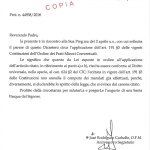The new Constitutions establish that “election to the offices of Minister General, General Definitor, Minister Provincial, and Custos is limited to only two consecutive terms.” (No. 191 §3).
This norm, inspired by universal law (CIC can. 624 §§1-2) shall apply both to Superiors elected in Chapters celebrated after the new Constitutions go into effect as well as those Superiors who are already holding office, and who may have recently completed two consecutive terms.
Although applying this norm to Superiors who are now completing their second term may appear retroactive and contrary to the prescript of (CIC can. 9), it is clear to the common understanding of the Chapter that this norm stipulates that from now on, Superiors who have held office for two terms, without specifying whether they were elected to office before or after the Constitutions go into effect, may not be re-elected for a third term.
The Secretary of the Congregation for Institutes of Consecrated Life and Societies of Apostolic Life expressed himself in this regard in his letter dated April 25, 2019 (Prot. 44 938/2018).
However, it is possible to “postulate” a candidate for a third consecutive term (can. 180 §1) by way of derogation from this norm in the Constitutions.
The postulation must be supported by two thirds of the electors (can. 181 §1) and must be presented, through the Minister General and his Definitory, to the Congregation for Institutes of Consecrated Life and Societies of Apostolic Life. The Congregation itself approved the norm allowing for the derogation (can. 182 §1).
The procedure is the same as that for postulating non-clerical Guardians.
It should be pointed out that the candidate being postulated does not acquire any title from his postulation (can. 182 §3), and may only acquire the office in full right after his election has been admitted by the Congregation by Rescript (can. 183 §3).
Friar Maurizio DI PAOLO, Procurator General















